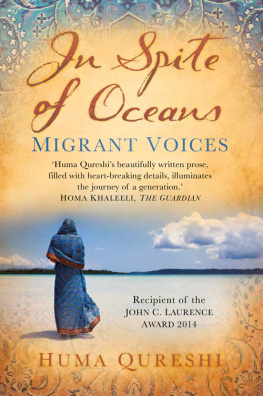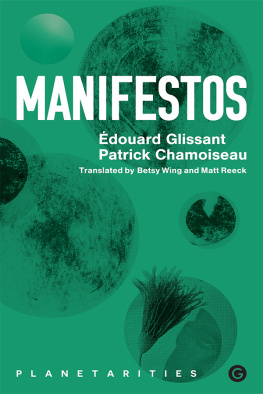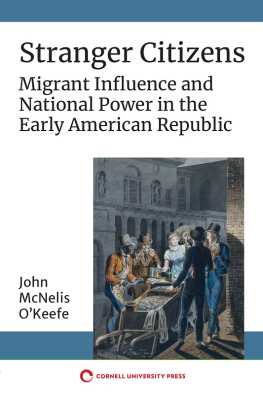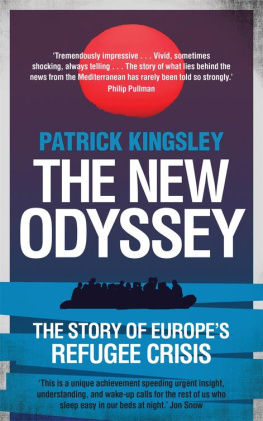Migrant Brothers
Migrant Brothers
A Poets Declaration of Human Dignity
Patrick Chamoiseau
Translated by Matthew Amos and Fredrik Rnnbck

English translation copyright 2018 by Yale University.
Originally published as Frres migrants. ditions du Seuil, 2017.
Illustration Maya Tarnowski Mihindou.
Excerpt from Pier Paolo Pasolini, Scritti corsari, Garzanti Editore s.p.a., 1975, 1990, 2000, 2001, 2008 Garzanti Libri S.r.l., Milano.
Excerpt from Aim Csaire, Vertu des lucioles, La Posie, ditions du Seuil, 1994.
Excerpt from Georges Didi-Huberman appears by permission of the University of Minnesota Press from their forthcoming volume Survival of the Fireflies by Georges Didi-Huberman; translated by Lia Mitchell. English translation copyright by the Regents of the University of Minnesota. Originally published in Servivance des lucioles, 2009 by Les ditions de Minuit.
All rights reserved. This book may not be reproduced, in whole or in part, including illustrations, in any form (beyond that copying permitted by Sections 107 and 108 of the U.S. Copyright Law and except by reviewers for the public press), without written permission from the publishers.
Yale University Press books may be purchased in quantity for educational, business, or promotional use. For information, please e-mail (U.K. office).
Printed in the United States of America.
Library of Congress Control Number: 2017958971
ISBN 978-0-300-23294-3 (paper : alk. paper)
A catalogue record for this book is available from the British Library.
This paper meets the requirements of ANSI/NISO Z39.481992 (Permanence of Paper).
10 9 8 7 6 5 4 3 2 1
For
Hind Meddeb,
Jane Sautire,
Laetitia Fernandez,
Yasmina Ho-You-Fat-Deslauriers
And for
Ren de Ceccatty
This something that appeared ten or so years ago, well call it the disappearance of fireflies.
Pier Paolo Pasolini, 1975, shortly before his death
They dont know that their desire carries so far, into the great night that imprisons them.
Antoine de Saint-Exupry
Do not lose hope in fireflies.
Aim Csaire
We must then ourselvesstanding back from reign and glory, in the open breach between the past and the futurebecome fireflies and thereby form anew a community of desire, a radiant, dancing community despite it all, of thoughts to be passed on.
Georges Didi-Huberman
Contents
Preface to the English Edition: For a Global Hospitality
This book was born of an encounter in Paris. I had been invited to dinner by some of my friends. Not for the sole pleasure of seeing one another, but so that they might alert me to what was happening on the outskirts of the City of Lights. These friends are artists, actors, journalists, activists... They write in the press, perform on stages, film things in impossible places. They are in essence what I am not: people of action.
For months they had been battling on the most unexpected of front lines. Hundreds of peoplewho had overcome deserts, oceans, walls, lines of barbed wire, checkpoints, who had survived nightmarish campswere arriving in tireless waves only to crash against police violence in the very heart of Paris. They told me what they were experiencing: tales of daily assistance, accounts of brutality, medical care to be dispensed, endless steps to be taken in administrative dead ends. All of which was supplemented by photos and videos salvaged from their confrontations. They filled me with a mixture of guilt and silent indignation.
My friends, women of action, exhorted me to write in my own way about what was happening. By nature calm, rather contemplative, removed from activism, I always feel somewhat guilty in front of people who know how to act, and who act. Even if literature has often showed me the contrary, its rare for me to think straightaway that writing, when the emergency is under way, could turn out to be at all useful. douard Glissant thought differently. Every time we would write against something we considered unacceptable, he would be the one who initiated it. With vigilant serenity, he thought that beneath the facts, beneath the horror, a poetic vision was able to identify the forces at work, and among them to discern the acting power that alone, in the end, would be the key to a decisive response. Every act, he would say, was born of a poetics. Thus, poetics would usher in politics. My friends had reminded me, probably without knowing it, of Glissants thoughts.
The indignation they had managed to arouse in me hardened into a sort of obsession. What I knew or what I had sensed for months about the terrible migratory phenomenon became one of those particular torments which I can escape only through writing. I found it unbearable that in the Mediterranean, in the full light of day, thousands of people had already lost their lives. That in the coming months and years thousands of others were going to die, in the same places, in identical conditions, and in much larger numbers. That such a slaughter is possible in the twenty-first century, that we can simply tolerate the idea of it, accept the existence of it, can mean only one thing: a barbaric night has settled on the global conscience, and it no longer fears to show itself in the open and without shame. Many are those who say, Why should we care about this Mediterranean business! Its Europes problem! If theres barbarity, its only a European barbarity, it doesnt concern us! And many are those who retreat into the cocoon of good conscience.
And yet a quick look around the worldthe Americas, Africa, Asia, Europe, and their archipelagoesis enough to show us that migratory phenomena palpitate, persist, insist, convulse in one place, flare up in another. Everywhere, to various degrees, children, women, men who want to move are ground up in lawless spaces in which human beings become strangers to humanity. Borders are sharpened more and more like the blade of a guillotine. Around them, those who come as humans toward other humans, whose only crime is to be human and call out to their brothers and sisters from the depths of a very human distress, find themselves faced with systems which no longer know how to recognize a human being. As if those who ask for help were a breed of medusae that could be blotted out from the face of the earth. A quick look around shows us that this matter is one of the forces at work in the world, and even worse: that it risks becoming one of the major issues of our planet.
Our immediate future will be dominated by two formidable monsters:
1. Climate change.
2. The triumph of neoliberalism, and of its multidimensional perverse effects.
Two catastrophes that will lead to ecological upheaval, devastating pollution, nuclear accidents, reactionary wars, global precarity, and medieval misery... Populations affected in one way or another will not fail to rush off from wherever to wherever. These migratory impulses will only intensify. They will be transglobal but also transnationalbut also intranational...
Fixity has never existed in cultures, civilizations, or identities. It has never existed in life. Any one of us can, in the wake of a fire, a tornado, a tectonic fury, a job loss, be forced to leave home and ask for asylum a bit farther along, in his or her own nation or beyond. All of us risk finding ourselves inflicted with the conditions forced upon the migrants in the Mediterranean: a nearly systematic destruction as the only answer to distress. Inhumanity is still part of humanity. But when inhumanity sets itself up as a cogwheel mechanism it becomes
Next page






